Toward Freedom Board Member Jacqueline Luqman recently returned from a trip to Venezuela to take part in commemorations for the 20th anniversary of the defeat of the U.S. coup to oust then-President Hugo Chavez. Back in the United States, Jacqueline interviewed Carlos Ron, Venezuela’s Vice-Minister of Foreign Affairs for North America as well as the president of the Simón Bolívar Institute for Peace and Solidarity Among Peoples. They discussed on the Black Power Media YouTube channel the Venezuelan people’s victory over the 2002 coup as well as their continued fight against fascism, the historical struggle against imperialism, and how people outside Venezuela can be in solidarity with the revolutionary process.
Related Articles
Related Articles
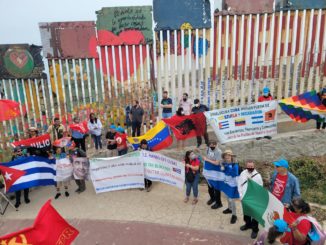
3 Counter Summits Called on Public to Stand Against Biden Administration’s ‘Failed’ Summit of the Americas
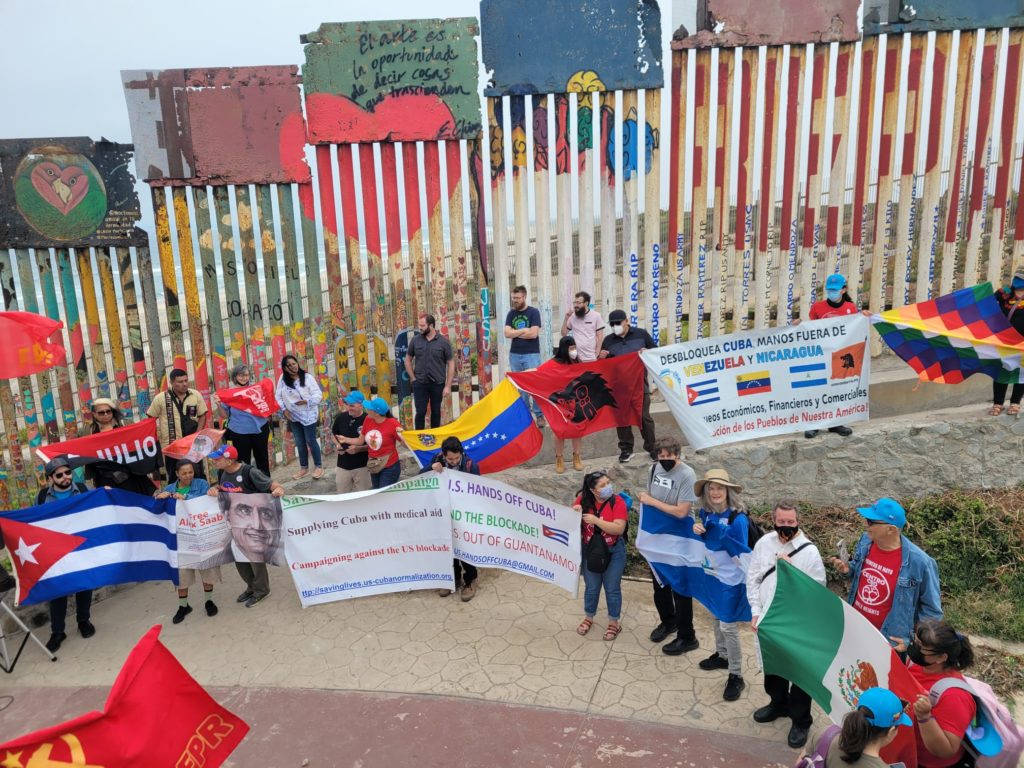
After the Biden administration announced it would exclude Cuba, Nicaragua and Venezuela from participating in the Summit of the Americas—held last week in Los Angeles—organizations based in the United States began collaborating with international organizations to organize counter actions.
Many people on the left had followed the activities of the People’s Summit for Democracy, the well-publicized counter event to the summit the Biden administration hosted. The Summit of the Americas was denounced as a “failure” for not coming up with a plan to address climate change, the debt crisis facing many countries in the Western Hemisphere, as well as increasing inflation and white-supremacist violence in the United States, among other issues.
What some may not know is anti-imperialists held two other counter summits last week: One coalition of mainly Los Angeles-based organizations hosted the Anti-Imperialist People’s Summit of Nuestra América on June 4 as well as a June 8 rally in the city, while another coalition organized the Workers’ Summit of the Americas June 10-12 in Tijuana, Mexico.
The following organizations sponsored the June 4 and June 8 Los Angeles-based anti-imperialist events: Unión del Barrio, Raza Unida Party, Black Alliance for Peace (BAP), United Teachers Los Angeles (UTLA), Frente Sandinista de Liberación Naciónal (FSLN), Socialist Unity Party, American Indian Movement Southern CA (AIM SoCal), Harriet Tubman Center for Social Justice, Bayan SoCal, Palestinian Youth Movement, Witness for Peace Southwest, Progressive Asian Network for Action, Farabundo Martí National Liberation Front (FMLN), Los Angeles Movement for Advancing Socialism (LA MAS), Canto Sin Fronteras, Zapata-King Neighborhood Council and Guardianes de la Tierra.
Meanwhile, more than 250 organizations involved in liberation struggles convened and/or endorsed the People’s Summit.
The Workers’ Summit of the Americas in Tijuana was the only event Cuban, Nicaraguan and Venezuelan officials could attend. The following organizations sponsored the event: Alliance for Global Justice (AFGJ), Coordinadora Nacional de Trabajadores de la Educación de Baja California (CNTE-BC), International Action Center (IAC), Plataforma de la Clase Obrera Antiimperialista (PCOA), Unión del Barrio, 1199 SEIU United Healthcare Workers East, Black Lives Matter – Oklahoma City, Freedom Road Socialist Organization (FRSO), Central de Trabajadores de Cuba (CTC), CODEPINK, Central Bolivariana Socialista de Trabajadores (CBST), Boston School Bus Drivers Union – Local 8751, Fire This Time (FTT), University of Tijuana, Movimiento Magisterial Popular Veracruzano, Federación Bolivariana de Trabajadores del Transporte – Sectores Afines y Conexos (FBTTT), Council on Hemispheric Affairs (COHA), FUNDALATIN, Interreligious Foundation for Community Organization (IFCO), Task Force on the Americas and Centro Community Service Organization.
Both the People’s Summit for Democracy and the Workers’ Summit of the Americas issued declarations (here and here). The Tijuana summit’s declaration announced plans for constituting a committee to convene annual meetings, among other actions.
Below are videos that can be viewed to learn more about each event:
- Anti-Imperialist People’s Summit of Nuestra América, June 4
- Black Alliance for Peace panel, “Defending Our Americas: Building Resistance to Imperialism and Militarism,” June 5
- Anti-Imperialist Rally, June 8
- People’s Summit for Democracy livestreams, June 8-10
- Workers’ Summit of the Americas, June 10-12
Moments from the anti-imperialist rally on Wednesday that denounced Biden as his caravan drove past, so he could make a speech to the Summit of the Americas. Featuring @dedanwaciuri, @blackleftaf and BAP-SoCal. #summitoftheamericas #peoplessummit22 #losangeles #biden pic.twitter.com/fxX6hirCCV
— Black Alliance for Peace (@Blacks4Peace) June 11, 2022
La Cumbre de las y los Trabajadores de Nuestra América inicia su jornada con participación de @CubaCentral #Cuba, @cbolivariana de #Venezuela, y #Nicaragua así como el sindicalismo #Mexicano @SMEexterior pic.twitter.com/xCIiZOXSSl
— Unión del Barrio (@UniondelBarrio) June 10, 2022
Anti-imperialist organizations taking part in the Workers’ Summit of the Americas gather at the Mexico-US border in solidarity with the Sandinista, Cuban, and Bolivarian Revolutions and send a message of repudiation of the US/OAS Summit of the Americas. pic.twitter.com/RF5XcFsppH
— Kawsachun News (@KawsachunNews) June 12, 2022
Julie Varughese is editor of Toward Freedom.
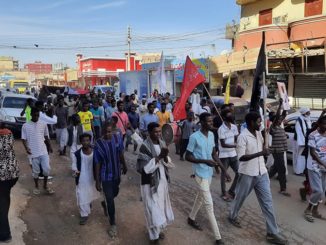
Hundreds More Injured in Anti-Coup Protests in Sudan As December Revolution Enters Fifth Year
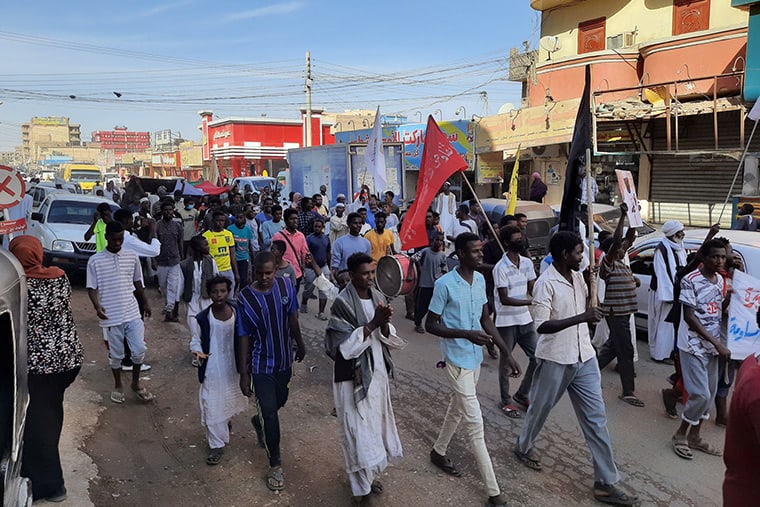
Editor’s Note: This article originally appeared in Peoples Dispatch.
Country-wide anti-coup demonstrations were underway once again in Sudan on Monday, December 26, a week after the previous “March of Millions” on December 19, during which 499 protesters were injured by the security forces in the three cities of Khartoum state alone. Sudanese have been protesting across the country against the power-sharing framework agreement signed earlier between the junta and right-wing political parties, and calling for the complete overthrow and prosecution of the leaders of the October 2021 coup.
Of the nearly 500 people who were injured on December 19, 226 had to be rushed to hospitals for treatment, while others were treated by medical volunteers on the field, according to the Association of Socialist Doctors.
Another doctor’s group, Central Committee of Sudanese Doctors (CCSD), estimated the total injuries treated in hospitals to be 155 in Khartoum State, and added that two of them with gunshot wounds had to be stabilized with surgeries. One protester is reported to have lost an eye.
Deliberately “targeting the eye,” “aiming tear gas canisters directly at the head,” and stun-grenade attacks on protesters who were already blinded by and choking on tear gas were systematic, CCSD added. Most of the injuries, 120 of them, were in the country’s capital Khartoum city, followed by its twin cities of Omdurman and Khartoum Bahri (North).
Demonstrations were also reported from at least 16 other cities outside Khartoum, including Wad Madani, capital of Al Jazirah state, Port Sudan, capital of Red Sea state, Atbara in River Nile state, and even capitals of civil war-affected states of South Kordofan and South Darfur.
The day marked the fourth anniversary of the start of the December Revolution in 2018. By April 2019, the mass protests had led to the overthrow of dictator Omar al Bashir who had been in power for nearly three decades. The Revolution did not stop, however, and continued the struggle against his inner circle of generals who had formed a military junta.
After a massacre on June 3, 2019, right-wing parties—a coalition calling itself the Forces of Freedom and Change (FFC)—entered into a power-sharing agreement with the military, forming a joint civilian-military transitional government in August 2019.
While maintaining control over much of the economy and foreign policy, the military ceded some power to civilian leaders chosen by the FFC parties for a period under this deal, before taking it back in a coup in October 2021. Soon after, the FFC parties opened another round of negotiations with the junta, and signed the framework agreement on December 5. This is said to be the first step toward a final agreement to pave the way for another transitional government.
In the meantime, relentless mass-demonstrations have continued since the coup. Led by Resistance Committees (RCs)—a network of over 5,000 of which are organized in neighborhoods across the country—hundreds of thousands have been taking to the streets several times nearly every month under the slogan, “No negotiation, No Compromise, No Partnership.” Thousands have been injured and over 120 killed in the crackdown on these protests.
On December 19, protesters in Khartoum, carrying portraits of those killed in the repression and waving national flags, once again marched to the Presidential Palace—the seat of coup leader and army chief Abdel Fattah al Burhan—amid the barrage of tear gas, stun grenades, and live bullets fired by security forces.
The marches in the capital city originated from 12 different locations and pushed toward the Presidential Palace along six separate routes, with some protesters reportedly getting as close as 1.5 kilometers (close to 1 mile) to the junta’s seat of power.
In an attempt to prevent the protesters from the capital’s twin cities of Omdurman and Khartoum Bahri from joining forces with those marching towards the Palace, security forces blocked the bridges over the Nile with large containers well before the start of the demonstrations.
“Early in the morning, the police had barricaded all the main roads of Omdurman with barbed wire and armored police vehicles. All over the city, the police were deployed in massive numbers. They fired hundreds and hundreds of stun grenades on the protesters,” said Osama Saeed, a member of the Sudanese Communist Party (SCP), who was among the protesters rallying in Omdurman.
He further claimed that many of the tear gas canisters were filled with stones and crushed glass, which, on exploding, sprayed shrapnel, injuring several at once. 82 different injuries were recorded in Omdurman, according to the Socialist Doctors. One young woman is reported to have lost her eye.
No Credibility
“[A]dherence to international human rights charters, especially charters of women’s rights… and protecting… freedoms of peaceful assembly and expression,” were commitments the coup leaders had made in the framework agreement with the FFC. The agreement assures that the “transitional authority” established after the final agreement would be “a full democratic civil authority without the participation of the regular forces.”
However, “the FFC political parties have signed six documents with the junta. None of them was respected by the junta,” Fathi Elfadl, national spokesperson of the SCP, told Peoples Dispatch. “Every time mass movements force the military to retreat, they buy time by signing such agreements with right-wing parties, and then violate them,” he added.
While the agreement makes way for a civilian prime minister and cabinet, Elfadl said that the real levers of power will nevertheless be held by what is envisaged in the agreement as the “Security and Defense Council.”
The agreement states that this body, consisting of the leaders of the security forces and of the six armed formerly rebel movements—those who signed the Juba agreement and went on to support the coup after getting a share in state power—will be headed by the Prime Minister. It declares that the civilian head of state is the supreme commander of the armed forces.
However, coup leader al-Burhan clarified to the media soon after signing the agreement that the “civilian Supreme Commander of the SAF (Sudanese Armed Forces)” neither “presides over the army chief” nor appoints him, but “only approves recommendations made to him.”
The agreement “prohibits regular forces from engaging in investment and commercial activities, except for those related to military manufacturing and military missions.” However, the army chief cautioned, “Do not listen to what politicians say about military reform… no one will interfere in the affairs of the army at all.” Matters of military reform are in any case only stated in principle in this agreement. The modalities will only be spelt out in the final agreement.
Regularizing a Notorious Militia
The formation of a single unified army and the disarmament and dissolution of all militias have been key demands of the pro-democracy movement since 2019. This is especially applicable to the notorious Rapid Support Forces (RSF), which carried out the massacre of June 3, 2019, and whose members are the soldiers who committed the atrocities in Darfur during the civil war under Bashir.
While Bashir stands trial at the International Criminal Court (ICC) for genocide, war crimes, and crimes against humanity, his footsoldiers, organized as the RSF, not only continue what has been called a depopulation campaign in mineral-rich Darfur, but also police the protesters in Khartoum.
This militia, which controls over a billion dollars in finances, is headed by the military junta’s vice-president, General Mohamed Hamdan Dagalo, also known as Hemeti, who will continue to be a powerful figure in the Security and Defense Council.
The framework agreement states that the RSF “will be integrated into the armed forces according to agreed timetables”. However, it also recognizes the RSF as a separate entity, terming it a “military force affiliated with the armed forces.”
Saeed said that the agreement is in effect regularizing the RSF as “a special force of the army,” which will effectively continue to operate autonomously instead of ensuring its Disarmament, Demobilization and Reintegration (DDR) as demanded by the pro-democracy movement.
He added that the agreement also makes a mockery of another central demand: the prosecution of all military generals and officers responsible for the massacre on June 3, 2019, and for all other atrocities, including war-crimes, committed since 1989 after the Bashir’s coup.
“Transitional justice,” the agreement states, “is an issue that needs the participation of the stakeholders and the families of the martyrs, provided that it includes all those who have been affected by human rights violations since 1989 until now.”
This is a “manipulation of the whole concept of justice, shifting the burden on to the victims and families of martyrs,” said Saeed. “What they are essentially saying is, the state is not responsible for any crimes, only individuals are. If someone got shot while protesting on the street, it is not the responsibility of the state, but of the individual soldiers or police or militiamen carrying out this action. So victims must cooperate with the state to help identify them. But the state and its high command will always be protected.”
‘The Juba Agreement Has Failed’
The implementation of the Juba peace agreement is another commitment in the framework agreement that the SCP and many other sections of the pro-democracy movement are radically opposed to. While the leaders of the armed rebel groups who signed the agreement have made peace with the army and the RSF in exchange for a share in state power and even went on to support their coup, peace has remained elusive for the people in the war-affected regions.
Since the Juba agreement in October 2020, hundreds of thousands have been displaced and several hundreds killed in massacres by the RSF and other militias it backs in Darfur, whose governorship has been handed over to a former rebel leader Minni Minnawi.
Communal clashes have also been engineered by the junta in the Blue Nile State by pitting tribes against each other, allegedly with the connivance of Malik Agar, a former rebel leader who signed the Juba agreement.
“The Juba agreement has failed. It is not only the Communist Party and the Resistance Committees seeing this – everybody knows. The displaced people living in camps, the refugees, are all suffering the further deterioration of security since the agreement. Massacres, rapes, and other atrocities are worse than before the agreement,” Elfadl said.
“We don’t need this agreement between leaders of military and armed groups. We need an agreement between people who have a real interest in bringing peace – between the representatives of the displaced people living in camps, the Resistance Committees and the civil society in Darfur. None of them were represented in the agreement.”
These groups, he said, must be brought together to address the roots of the conflict in a new agreement, addressing the question of facilitating the return of displaced people to their lands, the distribution of resources, and the disarmament of RSF and other militias. Without this process, he insisted, peace can never be realized in the troubled peripheries of Sudan.
Without addressing these contested issues of peace and justice, the agreement rushes headlong into an election at the end of the transitional period, which is to conclude two years from the date of the appointment of the Prime Minister.
Foreign Powers, Right-Wing Parties and the Junta Combine Forces
Saeed calls it the “Egyptian model,” referring to Abdel Fattah el-Sisi, who, after taking power in a military coup 2013, went on to legitimize his power grab by winning a “sham election” with over 96 percent of the votes in 2014. He has been Egypt’s authoritarian ruler since. Egyptian intelligence agents are “always around al-Burhan. They now even have an office in Sudan’s military headquarters,” Saeed said.
The Egyptian state, as well as the neighboring Gulf countries that are backing this deal, see the December Revolution as a threat not only to their interests in Sudan, but also to their own regimes domestically, he explained. These autocratic regimes, he said, fear that a successful revolution in Sudan might inspire the people of their own countries to revolt.
The United States, United Kingdom and European Union countries backing this domestically unpopular agreement also “prefer a military dictatorship” that they can use to advance their own interests in the country, located in a geopolitically crucial place on the Red Sea, Saeed argued.
“However, the Americans and their allies see the power of the streets. They see that the military junta has been paralyzed by the mass movement, and is not able to run the country. The situation today is that there is a junta on the top, but there is effectively no government to administer the country. So the Western powers and their regional allies hammered the right wing parties of the FFC to sign a deal with the military in an attempt to stabilize power in the country by hook or by crook.”
The stabilization of what will essentially remain military rule by simply giving it a civilian face is the goal of holding such an election, he said. Without the trials of the generals involved in the coups and other crimes since Bashir’s ascent in 1989, without first ensuring peace in the peripheral regions, any election—conducted in the absence of the right to organize, assemble, and express oneself freely—will be meaningless, he insisted.
“Even if the communists win such an election, they will not be able to accomplish anything,” because state power will still be held hostage by the forces of the dictatorship, Saeed said.
However, a consolidation of the authoritarian state through the alliance of the military, right-wing political parties, and foreign powers is far from certain, given internal contradictions.
The FFC split last month, and its constituent parties and armed rebel groups are currently squabbling over who should and should not be party to the agreement. In the meantime, their attempt to divide the mass movement with this agreement – with which they hoped to take a section of people off the streets from the protests – has “clearly failed,” said Saeed.
Pointing out that even rank-and-file members of the FFC are taking part in the protests against this framework agreement, he questioned what authority FFC leadership had to negotiate with the military.
“To negotiate, there should be a balance of power. The FFC has nothing. They don’t have the backing of the mass movements. Their own cadres are opposing the deal. That is why their leaders are found every night in the house of the Saudi Ambassador,” he said.
“They are relying on the backing of foreign powers to negotiate, but foreign powers are only interested in stabilizing the situation, even if it is on the terms of the military, so long as their interests are served.”
And the interests of the foreign powers are not unified either, added Elfadl. The UAE, which has “very strong relations” with Hemeti and the companies associated with his RSF, secured a $6 billion deal to construct a port in the Red Sea soon after the framework agreement. “This definitely goes against the interests of Saudi Arabia, and of Egypt, which is very closely allied with Bashir and his loyal generals in the army.”
The contradictions among foreign powers backing the consolidation of power in Sudan are also escalating the internal contradictions, including between the army and the RSF, he said. “Army officers are wary of integrating RSF among their ranks. The RSF, on the other hand, has been recruiting officers suspended from the army for one or the other reason.”
Unify the Resistance
In the face of attempts by this alliance of forces with contradictory interests to consolidate into a unified authoritarian state in Sudan, the main task is to unify the resistance, Elfadl said. “What we are trying to do now is to build a network for cooperation and coordination between the political activities of the Resistance Committees and the task of organizing a trade union movement.”
The first phase of the December Revolution, culminating in the overthrow of Bashir in 2019, was in fact spearheaded by the Sudanese Professionals Association (SPA), a coalition of trade unions, organized underground during his dictatorship.
However, after the formation of the joint civil-military transitional government, “we made a mistake,” he said. “The SCP and progressive movements had agreed that the next immediate task was to bring into force labor laws,” on the basis of which the trade union movement can be formally established.
“However”, with the failure to secure these labor laws under the former transitional government in which the military continued to have the greater share of power, “it proved to be the wrong approach. Since 1948, the working class and professionals in Sudan never had labor laws” to sanctify their unions. “Nevertheless, they called their general assemblies and organized their forces into a trade union movement, regardless of the law. This was the tradition, from which we had wrongly deviated recently.”
Arguing that “it is the right of the working class to organize themselves into unions,” Elfadl said, “we will organize the trade unions in accordance with the ILO conventions,” irrespective of labor laws (or the lack of it) in Sudan. The several separate strikes currently underway in the country makes the time fertile, and the task all the more urgent, argued Elfadl.
“This work must go hand in hand with the implementation of the proposals of the Resistance Committees for continued action on the streets. From this, the unity of action will emerge,” he said, adding that the SCP will strive to “unify the trade unions, Resistance Committees and the civil society on a common charter for the building of civil-democratic authority.”
Appealing for “international solidarity to stop the repression, and to force the junta to respect human-rights and the right to demonstrate”, Elfadl asserted, “the rest are tasks the mass-movement in Sudan is capable of achieving itself. It will defeat all the reactionary schemes, be it of international or local forces.”
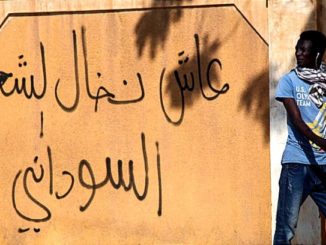
Understanding the Who and the Why of the Sudan Coup
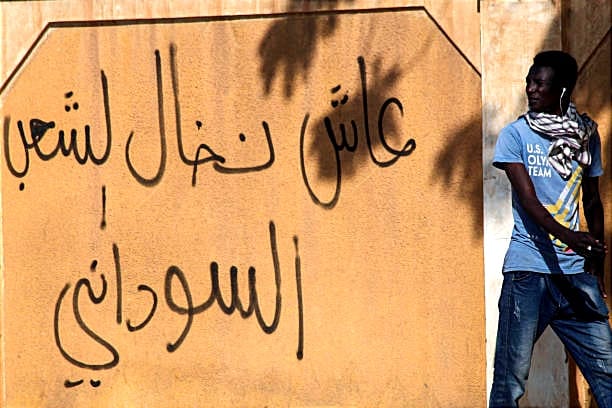
Editor’s Note: The following is the writer’s opinion and represents the first in a 2-part series on the October 25 Sudan coup. Part 2 can be read here.
The October 25 military coup d’etat in Sudan marked the collapse of the unstable and rotten compromise between the military and liberals that took place in the summer of 2019. That deal was brokered to stop the mass revolutionary process that had erupted and overthrown President Omar al-Bashir, who had been in power for 30 years. Despite the military junta’s declaration of a state of the emergency, the masses poured into the streets of the capital, Khartoum. Even Abdalla Hamdok was reinstated as prime minister by the military junta. The people in the streets who have fought and shed blood for a month to win civilian rule have met this news not with jubilation, but with rage.
What is going on in Sudan? This question constitutes the first point of contention in the international community, and this political dispute is, of course, reflected in the media. At a time when the idea is being promoted that differences in the international community over what is happening are nothing more than a reflection of the international conflict, it should be remembered that the Sudanese people are most concerned with this division.
It is often said the events in Sudan until this moment were an intense expression of an international conflict. From this correct idea, another wrong idea was adopted, which was that the Sudanese people inevitably will be victims of these international duels. To respond to this idea, the conflicting parties in Sudan must first be described.
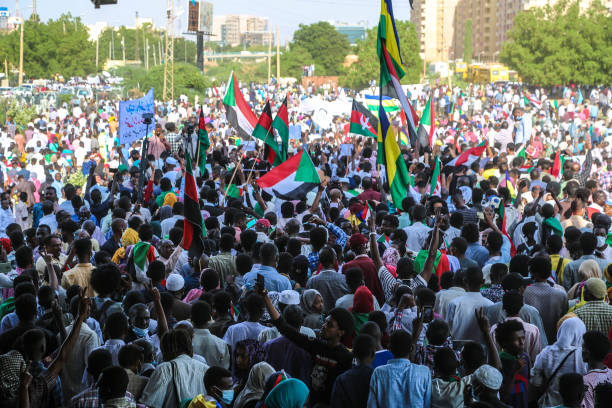
Internal Forces Share Power
What are the features of the “old” that should be changed?
The main contradiction in Sudan is among looters, regardless of their dress and political names, and regardless of whether they are “civilians” or “militaries.” However, the poles of the current conflict were only partly an expression of this basic contradiction. When the Sudanese people took to the streets at the end of 2018, they were expressing the need for the required profound change, and with Bashir’s security committee, formed from the main military forces in the country, removed him from power.
The Sudanese Sovereign Council is an 11-member body that was created after Bashir’s ouster through the draft constitutional declaration in August 2019 in the South Sudanese city of Juba. Members of a civilian group called Forces for Freedom and Change (FFC) and leaders of the Transitional Military Council (TMC) comprised this council, a collective body that was meant to act as the head of state until November. Instead, the council was dissolved with the October 25 coup. Council leader Abdel Fattah al-Burhan announced the dissolution, adding it would be replaced with a government that would be nominated.
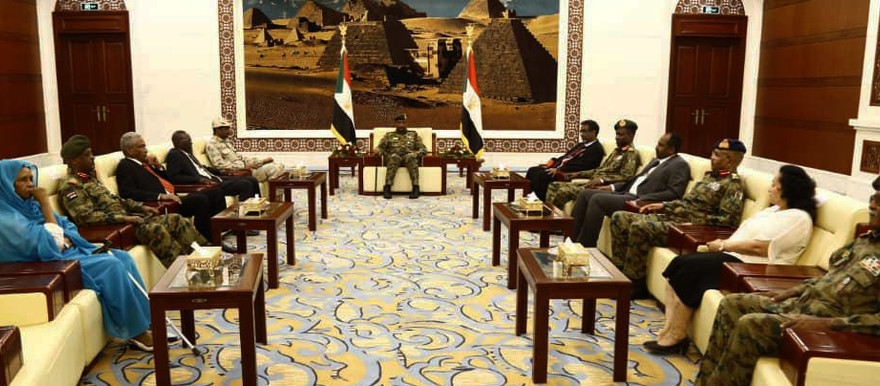
Up to the formation of the Sudanese Sovereign Council and its recently dissolved government, Sudan began to witness political changes in the governance structures, without the required deep change. The structure of the Sudanese regime was characterized by basic general features. It is not possible to talk about an actual transformation if the Sudanese people did not perceive a change in these features, which has not happened until now.
So what are these basic features? The Sudanese national framework is placed at the top of this list, as Sudan has lost its southern part and is living in a continuous state of armed civil conflicts in scattered areas of the country. These elements constituted a double threat to the unity of Sudan, meaning the primary challenge is Sudanese people live in an entity whose existence is threatened.
In addition to these existential dangers, Sudan was systematically looted by the West through Sudanese intermediaries, and its people were starved and impoverished, so unemployment and marginalization increased. The production process in all its forms was hampered to turn Sudan’s fertile lands into battlefields. Its workers and peasants were turned into fuel for these conflicts, and mercenaries in foreign wars.
The Sudanese have nothing to do with it. Sudan was blackmailed by placing it on the U.S. state sponsors of terrorism list, and turning it into a country that lives on Western aid and loans with well-known political conditions in place. All this came in addition to disrupting political life and the absence of effective national forces caused by suppression, then plunging the country into conflict with armed forces, whose voice for long periods overshadowed the voice of the national forces.
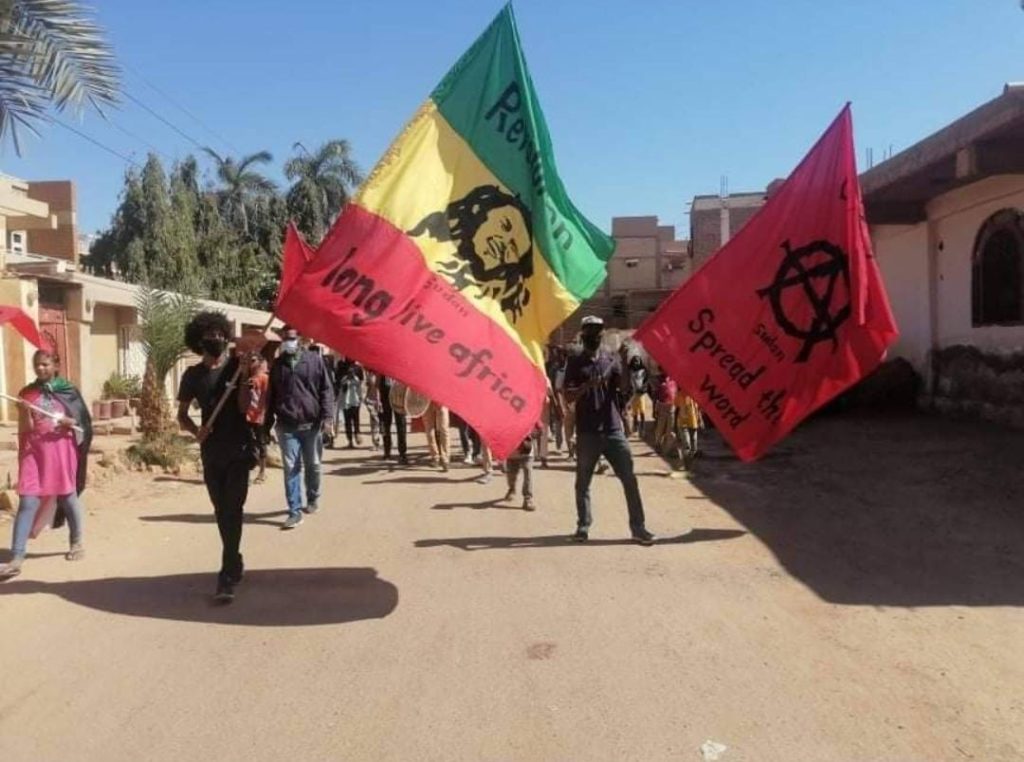
UNSC Speaks on the Coup
How can we read the positions of the primary forces in conflict?
The dispute erupted between the civilian and military components of the Sudanese Sovereignty Council after a conflict that remained unabated even after the body was established. In fact, no clear distinctions in the positions of the “civilians” or the “militaries” emerged. Both parties contributed to the consolidation of the liberal policies that brought the conditions of the Sudanese to this point. Both parties clearly contributed to the notorious normalization agreement with the Zionist entity known as Israel, and neither provided any serious direction to establish national reconciliation to prevent the fragmentation of the country. Despite their seemingly identical positions, the military’s move on October 25 constituted a controversial point on the international scene, which indicated regional and international powers differentiate between the two components of the Sovereign Council. That led to the UN Security Council failing several times to obtain consensus on a statement on the events in Khartoum. When a statement emerged on October 28, the UNSC described what happened as “controlling the power,” not as a coup. The statement also stressed the “need to adhere to the constitutional document and the peace agreement in Juba” and called on the authorities. The military was asked to “restore the civilian-led transitional government on the basis of the Constitutional Document and other foundational documents of the transition.”
The difficulty in adopting this statement did not in any way end the divided opinions on what occurred in Sudan. Rather, it reflects the international balance of power that has impeded a correct characterization of the coup and softened rhetoric toward the military.
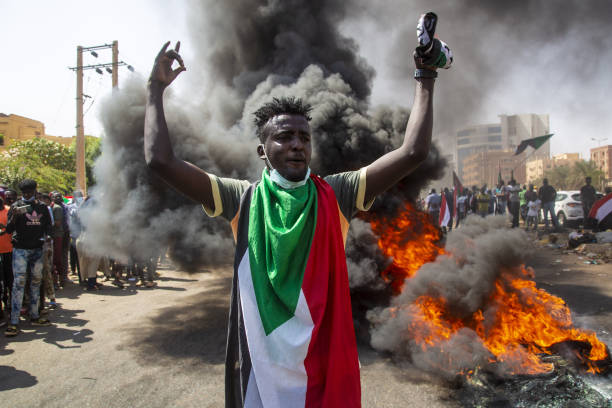
Returning to the White House’s Bosom
But the most important question remains: What has caused different countries to take various positions on the military move?
After the military overthrew Bashir in 2019, Sudan entered a period of anxiety that drastically changed its relationship with the world. The most noticeable of which was Sudan’s official and gradual return to the bosom of the “Western House”—a term used for the White House. This involved re-opening the door for loans, lifting sanctions, and removing Sudan from the U.S. state sponsors of terrorism list, among other things.
All this prompted observers to search for the price Sudan had to pay in exchange for this “Western amnesty.” At first glance, it seemed to be normalization of relations with the Zionist entity, Israel. However, events today indicate normalization was only the public aspect of the cost to Sudan. The military component was the first to brag about relations with the Zionist entity. However, the West seems very concerned about the military’s unique power and the exclusion of the civilian component. The primary explanation for all this appears to lie in the obscured part of the price Sudan paid to the Washington. Although it is difficult to be certain about this issue, we can conclude the West is more comfortable with the Sudanese Sovereign Council’s civilian component headed by the now resigned Abdalla Hamdok, who grew up within the same Western institution and is considered close to it. The civilian component would build relations with the West and Washington at the expense of Russia and China, for example. Hence, removing Sudan from the U.S. list of state sponsors of terrorism and other facilities came as an opportunity to restore these relations and push relations with Russia and China to a kind of apathy, in addition to some indicators coming from Egypt.
Questions raised about Hamdok’s position on the Renaissance Dam, which is being built in Ethiopia and threatens to cut off water access to Egypt, expresses Washington’s tacit satisfaction with the Sudanese army’s move. It seems the list goes on to include differences in attitudes of the civilian and military components on the nature of Sudan’s relationship with the world. Although some of those attitudes are still unknown, but we can expect to hear of them soon.
The door to interpretations is very wide, but it will not be long before the players reveal their secrets as positions and alignments cannot be hidden for long. Power today is in the hands of the Sudanese army, which is subject to external and internal pressures. From this particular angle, it can win over the Sudanese people’s support in confronting external pressures. Sudan needs to alter its position in the global conflict to be in the place that meets the interests of its people. That is, inevitably away from the Western camp and Washington.
Kribsoo Diallo is a Cairo-based Pan-Africanist researcher in political science related to African affairs. He has written for many African magazines and newspapers, and Diallo has contributed to translated editions of papers and articles in Arabic and English for several research centers within the African continent.
